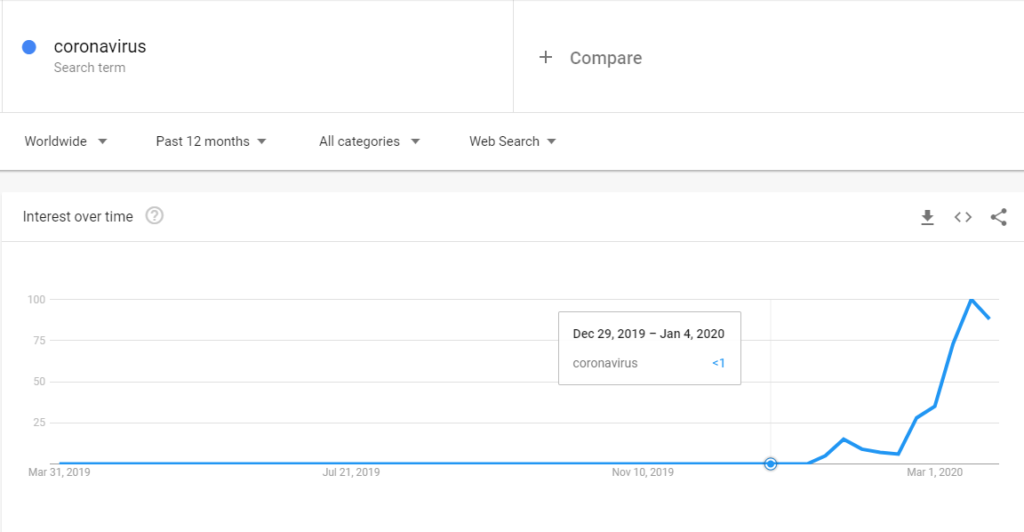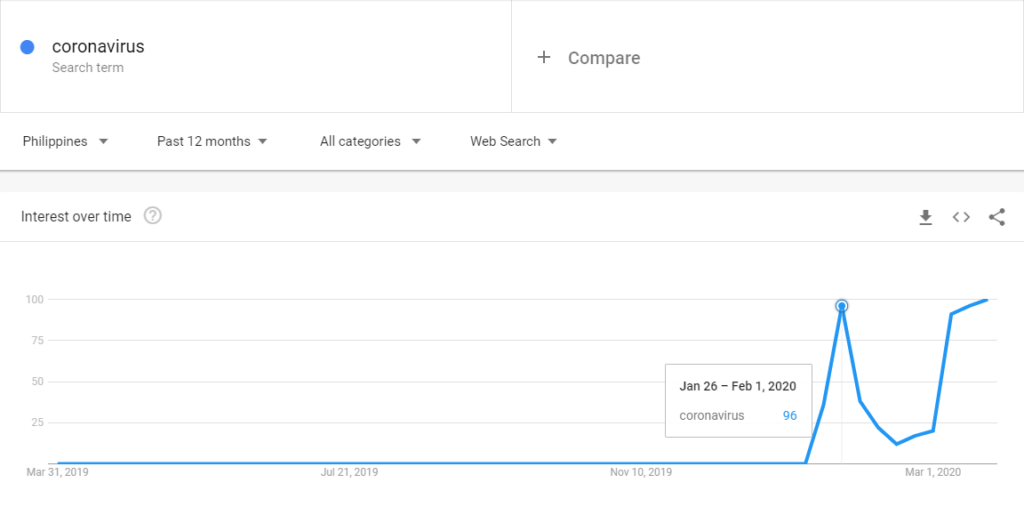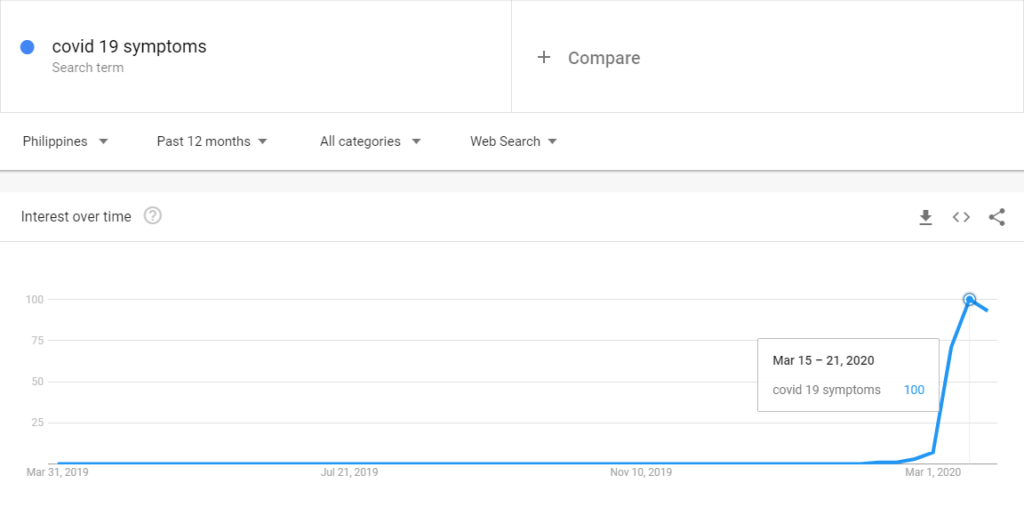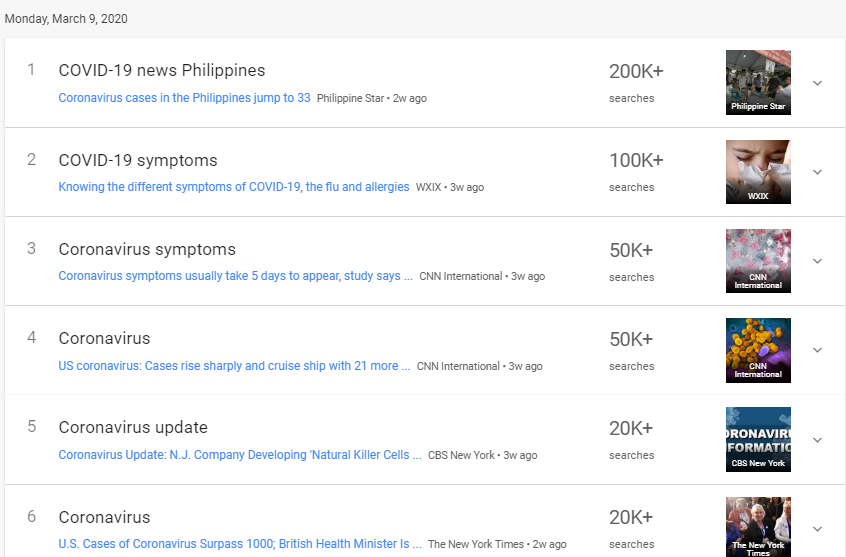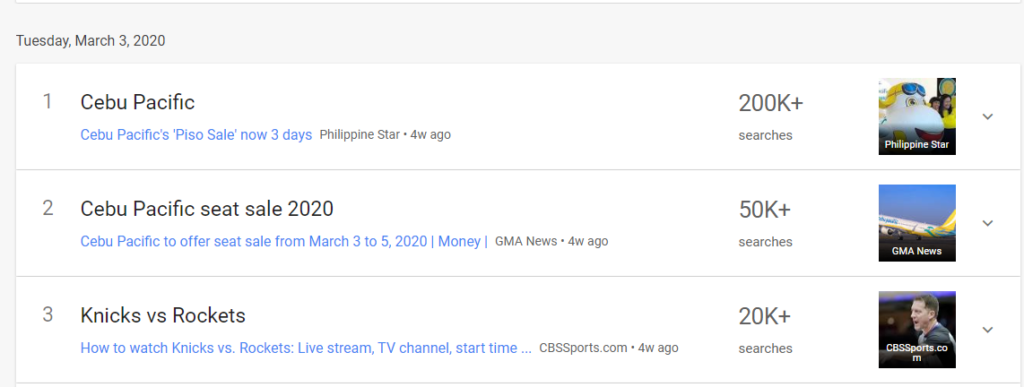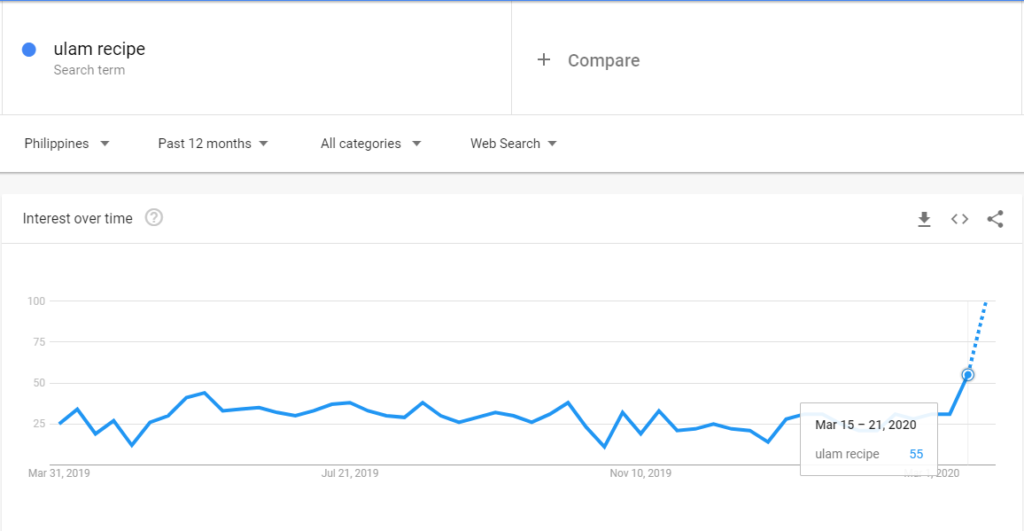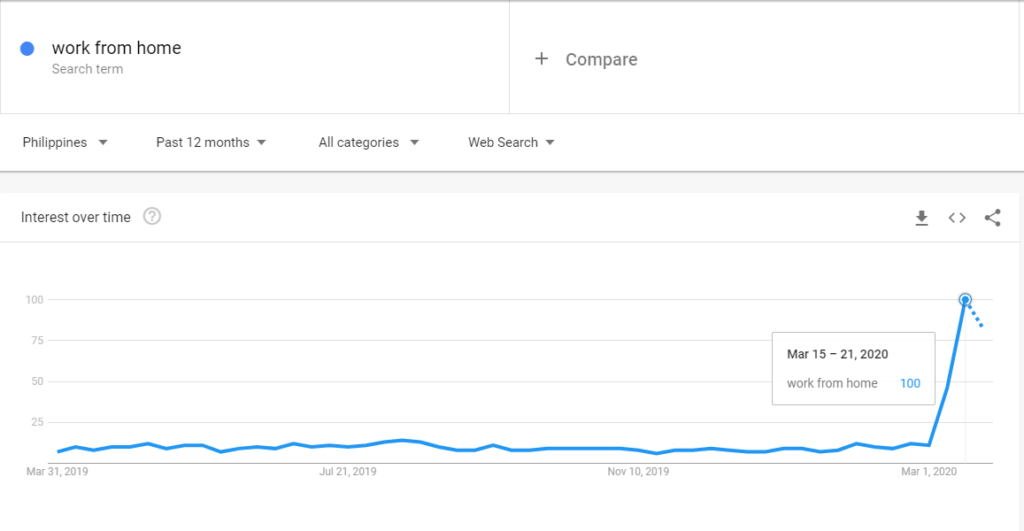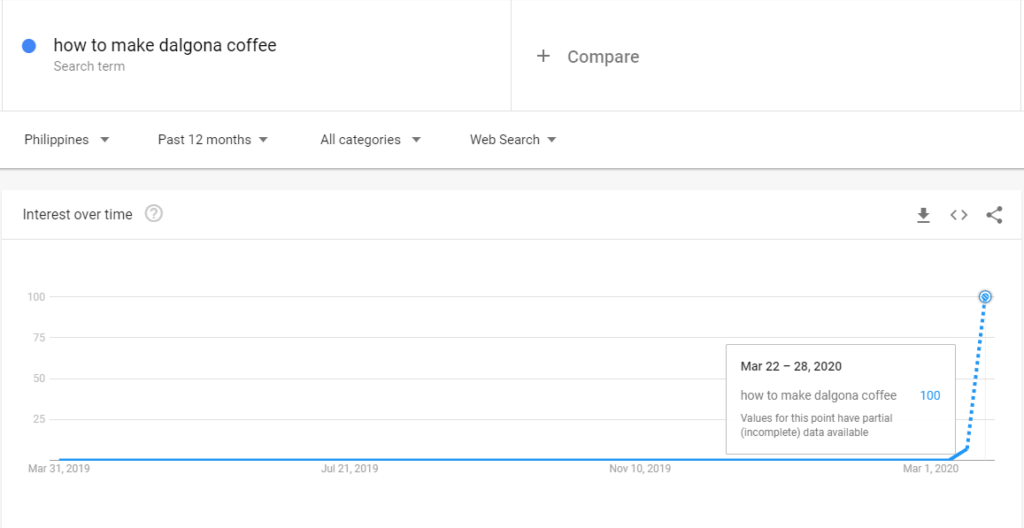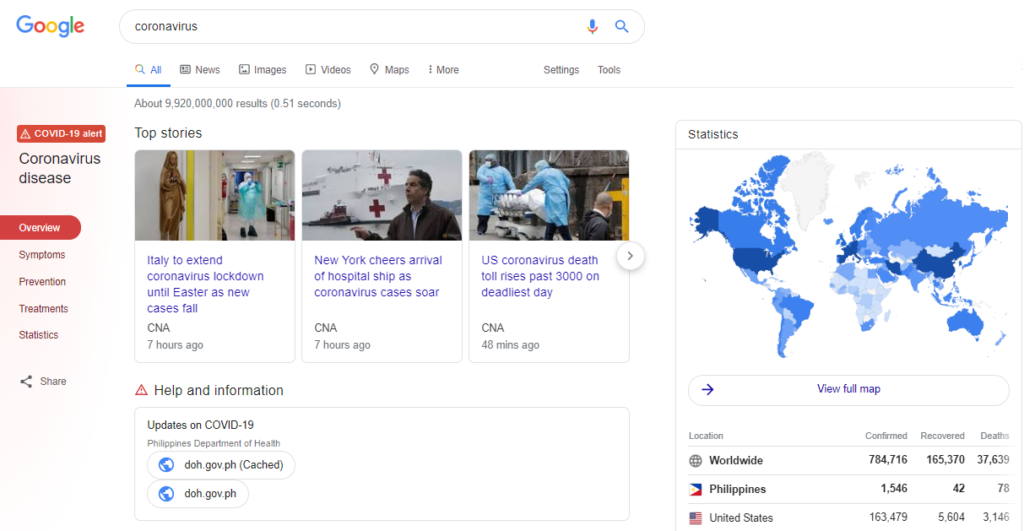Search Trends in the Time of Coronavirus
I have heard of people who have been calling the past few days, the “new normal”. We are in the midst of history. The way that health sectors, technology, and businesses regenerate from this crisis will dictate progress that will come in the coming years. For those who are staying at home, this is the perfect time to learn. Seize this opportunity to know more about the world, study that foreign language you’ve been meaning to learn, and for those who do SEO, take COVID-19 as a case study of how search works as a lifestyle for people.
As the Philippines undergoes a lockdown due to the pandemic, online activities have significantly increased and search trends are affected as well. Google Trends is something that we keep an eye on at this time since it helps in making sense of the volatility of the search algorithm. For those wondering how the world of search works during these trying times, here is your brief overview of how the pandemic greatly impacts search behavior and insights on what we can learn from it.
Timeline of the Pandemic as Related to Search Trends
Looking back, the Philippines has not always been in this state of urgency. The first burst of news surrounding the virus started on the last day of 2019 but our country is just catching up on information about it. As I’ve said before, people have been holed up at home now more than ever so it only makes sense that they have been using Google to stock up on news about it.
First-Ever Recorded News About the Virus
December 31, 2019, is the date when China first sounded the alarm bells for the World Health Organization (WHO) regarding several cases of severe pneumonia from Wuhan, ground zero for the virus which is located in the central Hubei province. The virus is still unnamed during this time.
Search trends worldwide can be seen as a flat line since it was not regarded as a global threat back then as WHO only confirmed that it is a new virus called 2019-nCoV on January 7, 2020.
The interest over time having zero data is also surprising since the COVID-19 pandemic is not the first time that the world has seen a coronavirus case. We were plagued by the Severe Acute Respiratory Syndrome coronavirus (SARS-CoV) back in 2003 and the Middle East Respiratory Syndrome coronavirus (MERS-CoV) in 2012.
China’s Cooperation with WHO
China has since shared the genetic sequence of the virus on the day of January 12 which called for the development of diagnostic kits since the cases of pneumonia in Wuhan ruled out (SARS-CoV), (MERS-CoV), Influenza, and adenovirus as the cause.
The Philippines’ First Encounter with NCoV
The first case of coronavirus has been confirmed and recorded in the Philippines on January 30. The Department of Health reported the first case of the coronavirus in the country, with the patient being a 38-year old Chinese national. This is when a spike of interest happened in search as many people sought information about this unknown virus prior to the Wuhan Outbreak in December 2019.
Before the first case of local transmission was even reported, people have been searching for the symptoms of coronavirus. Whether it is anxiety over contracting the disease or simply seeking information about it, we’ll never know.
 Reported the First Death
Reported the First Death
The first death from the disease in the Philippines was confirmed on February 2. This has sparked a global interest in this particular case in the country since this is the first death that has been reported outside mainland China.
First Local Transmission in the Country
The first local transmission in the country was reported which gave way to the Code Red Sub-Level 1 that was raised as the virus cases continue to increase day-by-day. Search has also seen a change in behavior in the results as the interest of people who have been searching for coronavirus cases spiked up during this period.
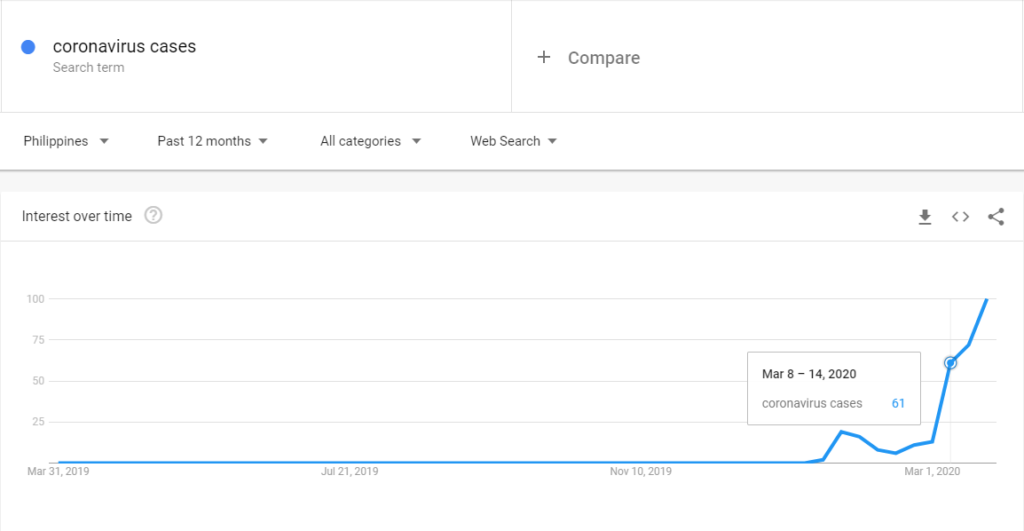 Incidentally, this is the period when coronavirus trending topics occupied search as evidenced by these tending searches on March 9:
Incidentally, this is the period when coronavirus trending topics occupied search as evidenced by these tending searches on March 9:
This is a far cry from the search trends during the first week of March since it remained consistent for topics concerning NBA games with Coronavirus related searches as minor players in the trends. Since the pandemic also affected the operations of the NBA, the trending searches for the games came to a halt when they announced that the season is suspended indefinitely due to the virus.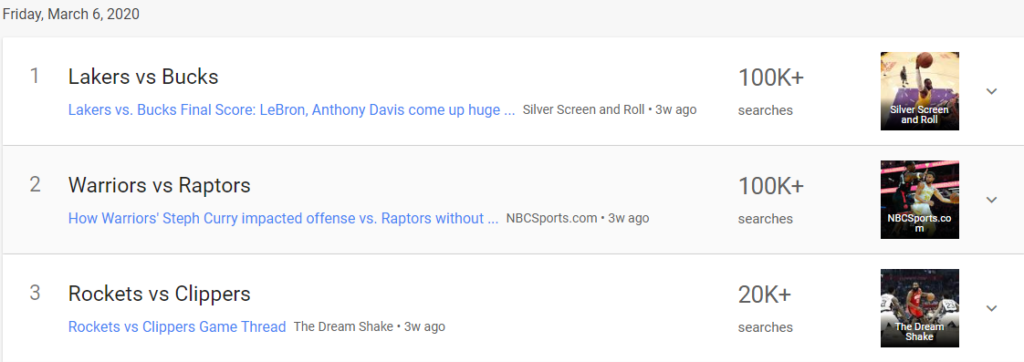
A snapshot of the trending search on March 3 even shows people searching for a seat sale, in the hopes of a vacation in the near future, which suggests that search went about as usual even after news broke about the virus.
With everyone staying at home now, searches have changed for interests like the ones found below:
Staying at home means more home-cooked meals so it’s no wonder that there is an increase in the interests in ulam recipes.
Private sectors resorted to flexible work arrangements due to the suspension of public transportation and the nationwide lockdown. There is a surge of interest for work from home query maybe from employees who would like to learn more about their new work setup.
The recipe for this frothy coffee has been making the rounds of trends nowadays. There are many people who have developed an interest in this beverage as seen on this trend interest over time, as well as social media posts for this coffee recipe.
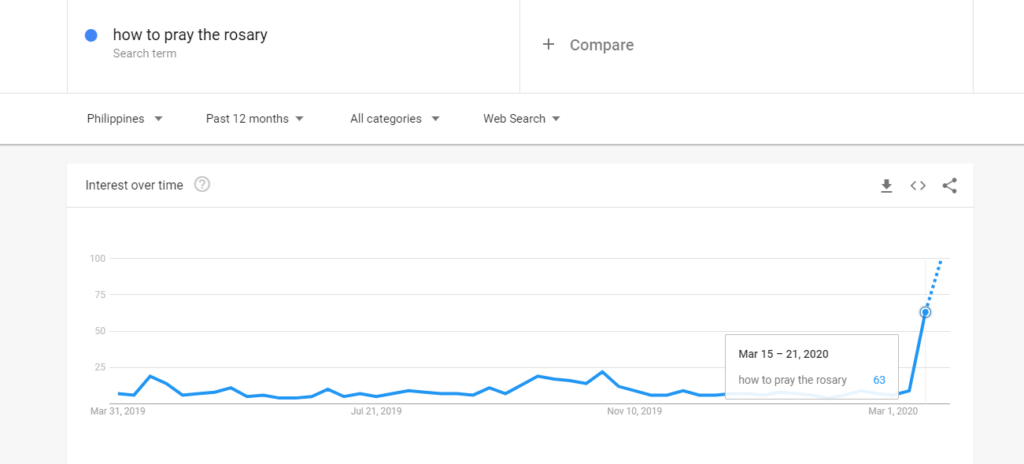
Of course, with the impending risk of disease, prayer should always be a part of the daily routine of the predominantly Catholic country. Since March 15, people have been searching for articles on how to pray the rosary.
Huge spikes in these queries suggest that the Filipino people have been actively seeking information at home that is fit for their current interests now.
User Behavior and SERPs During Corona
As the world grapples with this unspeakable disease, we see that priorities and behavior are drastically revamped through the search activity of the people. User behavior in search has been analyzed time and again, with RankBrain being the primary consideration for SEOs.
These trending searches can mean that even if user behavior does not directly affect machine learning, it is heavily influenced by it. Google has always been about delivering information which is why at this time of crisis, they have developed a page for coronavirus with SERP features unlike the normal format before:
Search results for health queries regarding the virus are dominated by news and government sites with the ever present Wikipedia link of course. One thing that I also noticed is the help and information section tailored-fit for the Philippines with our Health Ministry website links embedded in a snippet. Is this also the same for your country? Let me know in the comments below.
Significance of Medic Update
Two years since Google rolled out one of the largest search engine algorithm updates, called the Medic, it is resounding in the search results now more than ever.
Query intent is explicitly called for in this day and age especially since a tiny chance of misinformation can cost a life. From the search trends we have previously discussed, you can see that people greatly rely on search for information. This is especially true for the period when we do not even know what the virus entails.
This is why optimizing your site for best practices and to adhere to the standard the algorithm updates is important. Pages that perform well in the service of satisfying search intent will be rewarded with the fact that information has helped people for the better. You can also say the same about YMYL sites.
The Medic update is significant simply because it honors E.A.T. especially since the situation now calls for transparency and accountability from the right people. Reflect user behavior and intent in your content, this will go a long way even when this pandemic is over. Continue optimizing and never lose faith in this time of struggle.
Key Takeaway
Even if the world outside comes to a pause, the world of search is still very much alive. This is also one of the factors that you consider if you are thinking of cutting off digital marketing from your business.
Sure, we are at a standstill but still, imagine the possibilities once the world has recovered and is in motion again. Continue optimizing for user behavior using the best practices and you will be just fine doing SEO during COVID-19 season.
I know that these are difficult times for all of us. Even though we are plagued by this disease, we must keep faith and trust that everything will be alright. If you are reading this now, just know that we will pray for you and your family’s best interest, keep safe.

